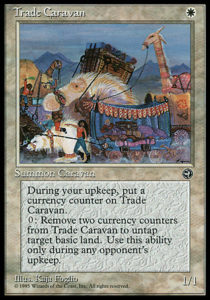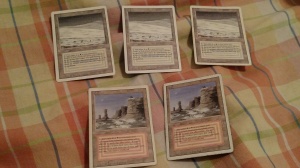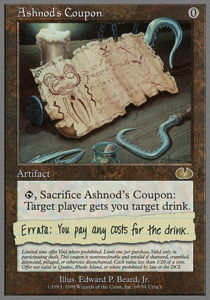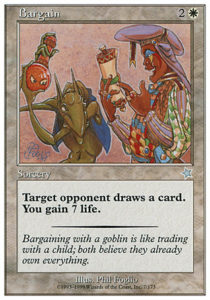Grand Prix New Jersey made for one hell of a weekend. I know eight folks who made day 2 and am exceptionally proud of our community. Congratulations to everyone, particularly fellow Hipsters Dave, Tim, and Derek!
As for me, I didn’t play in the main event. I haven’t played Legacy since March and I didn’t have the time to practice. Plus, I’d need to borrow a lot of cards (mostly duals), to have a Legacy deck I’m comfortable piloting. Instead, I hung out at the GP on Friday, chatted with Matt and Rich, played in some side events, and sold a whole bunch of cards I had lying around. I got these in return:
Turns out, accruing random cards for four and a half years can be worth more than one would expect. Looks like I won’t need to borrow nearly as many duals to play Legacy. …which I… don’t want to play. At least I can trade them… except I don’t enjoy trading.
Wait, why did I pick these up? I don’t need them!
Because the rules said so.

The rules of trading Magic are self-evident and quickly internalized. You trade Standard stuff for Modern stuff. Standard cards usually lose their value when they rotate out of Standard; Modern cards never rotate out of Modern and accordingly, don’t lose their value over time. Legacy and Vintage staples on the Reserved List, like the original dual lands and the Power Nine, are the gold standard, since their supply will never increase and they’re in high demand.
That’s all well and good, and it’s certainly why I am now the confused owner of dual lands. However, to me, Magic isn’t about investment bank- er, trading, it’s a form of entertainment.
Entertainment isn’t transferable. When I see a movie, go out for dinner, or take a trip, I can’t turn those experiences into money. Yes, I can critique a movie for pay or sell my plane tickets, but I can’t have those experiences and sell them to someone else. I either experience them, or I don’t. I either eat that dinner, or someone else does.
Magic is different—it’s like buying a house. You experience it, and when you’re done, you can sell it and make back all your invested money, or even a substantial profit. Buying a house, however, isn’t entertainment. It’s a life decision. So’s Magic; it’s a life decision… and entertainment.
Magic is a game that allows and encourages players to speculate on card prices. It’s a game with its own stock market. Even though (I’d argue) a majority of Magic players consider Magic a form of entertainment, we still see it through the lens of our cards’ worth: its financial component is present when we trade (for value), crack packs (for chase rares), and buy cards (when they’re at a good price). We feel good when we open a foil mythic (even if we’re never going to trade it) and feel bad when we ‘get duped’ in a trade (even if we received cards we wanted and got rid of cards we didn’t need).
The question I find myself asking, and I encourage you to ask yourselves, is how much the financial component matters to me. Am I caught up in the practice of “acquiring value” for its own sake? Do I really care about value?
I don’t care that much. I feel bad when I make a bad trade, sure, but I attribute that to the feeling of being taken advantage of, of being used, rather than the feeling of having lost (a generally small amount of) money. I don’t want to speculate on cards, even when I know they’re undervalued. At the end of the day, Magic is almost entirely entertainment, and much like movies and trips, I expect to put money in, not get it out.
As for what I’ll do with my duals, I don’t know. Perhaps I’ll play some Legacy. Perhaps I’ll sell them or trade them for [casthaven]Tarmogoyf[/casthaven]s (which I’ll use in Modern). Perhaps I’ll give them away in another Hipsters contest. It has been a year since the Standard Pauper tournament, after all.
I’m curious what your experiences are. What does value mean to you? How important is it to you that your cards are worth money, that you can grow your investment, or that you can cash out when all’s said and done?
And, as always, thanks for reading.
—Zachary Barash
Zachary Barash has been playing Magic on and off since 1994. He loves Limited and drafts every available format (including several that aren’t entirely meant to be drafted). He’s a proud Cube owner and improviser, creating entire musicals from scratch every week. Zach has an obsession with Indian food that borders on being unhealthy.




